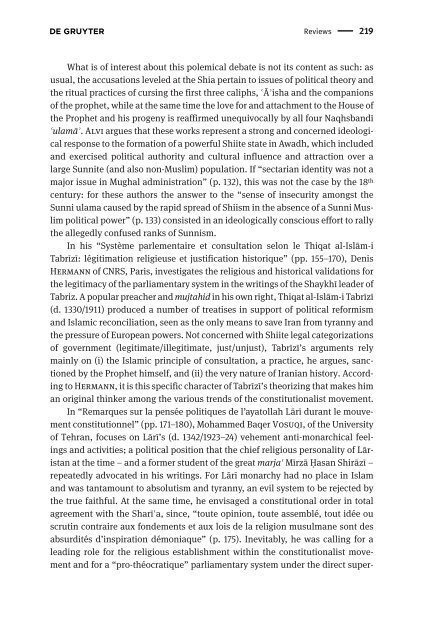0021-1818_islam_98-1-2-i-259
0021-1818_islam_98-1-2-i-259
0021-1818_islam_98-1-2-i-259
Create successful ePaper yourself
Turn your PDF publications into a flip-book with our unique Google optimized e-Paper software.
Reviews 219<br />
What is of interest about this polemical debate is not its content as such: as<br />
usual, the accusations leveled at the Shia pertain to issues of political theory and<br />
the ritual practices of cursing the first three caliphs, ^A#isha and the companions<br />
of the prophet, while at the same time the love for and attachment to the House of<br />
the Prophet and his progeny is reaffirmed unequivocally by all four Naqhsband\<br />
^ulama#. Alvi argues that these works represent a strong and concerned ideological<br />
response to the formation of a powerful Shiite state in Awadh, which included<br />
and exercised political authority and cultural influence and attraction over a<br />
large Sunnite (and also non-Muslim) population. If “sectarian identity was not a<br />
major issue in Mughal administration” (p. 132), this was not the case by the 18 th<br />
century: for these authors the answer to the “sense of insecurity amongst the<br />
Sunni ulama caused by the rapid spread of Shiism in the absence of a Sunni Muslim<br />
political power” (p. 133) consisted in an ideologically conscious effort to rally<br />
the allegedly confused ranks of Sunnism.<br />
In his “Système parlementaire et consultation selon le Thiqat al-Islam-i<br />
Tabr\z\: légitimation religieuse et justification historique” (pp. 155–170), Denis<br />
Hermann of CNRS, Paris, investigates the religious and historical validations for<br />
the legitimacy of the parliamentary system in the writings of the Shaykh\ leader of<br />
Tabriz. A popular preacher and mujtahid in his own right, Thiqat al-Islam-i Tabr\z\<br />
(d. 1330/1911) produced a number of treatises in support of political reformism<br />
and Islamic reconciliation, seen as the only means to save Iran from tyranny and<br />
the pressure of European powers. Not concerned with Shiite legal categorizations<br />
of government (legitimate/illegitimate, just/unjust), Tabr\z\’s arguments rely<br />
mainly on (i) the Islamic principle of consultation, a practice, he argues, sanctioned<br />
by the Prophet himself, and (ii) the very nature of Iranian history. According<br />
to Hermann, it is this specific character of Tabr\z\’s theorizing that makes him<br />
an original thinker among the various trends of the constitutionalist movement.<br />
In “Remarques sur la pensée politiques de l’ayatollah Lar\ durant le mouvement<br />
constitutionnel” (pp. 171–180), Mohammed Baqer Vosuqi, of the University<br />
of Tehran, focuses on Lar\’s (d. 1342/1923–24) vehement anti-monarchical feelings<br />
and activities; a political position that the chief religious personality of Laristan<br />
at the time – and a former student of the great marja^ M\rza 0asan Shiraz\ –<br />
repeatedly advocated in his writings. For Lar\ monarchy had no place in Islam<br />
and was tantamount to absolutism and tyranny, an evil system to be rejected by<br />
the true faithful. At the same time, he envisaged a constitutional order in total<br />
agreement with the Shar\^a, since, “toute opinion, toute assemblé, tout idée ou<br />
scrutin contraire aux fondements et aux lois de la religion musulmane sont des<br />
absurdités d’inspiration démoniaque” (p. 175). Inevitably, he was calling for a<br />
leading role for the religious establishment within the constitutionalist movement<br />
and for a “pro-théocratique” parliamentary system under the direct super-


